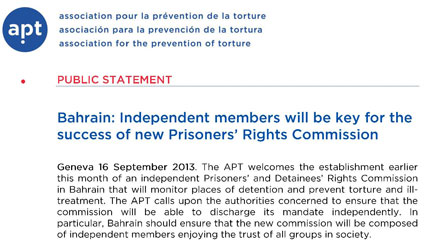
|
 |
 |
|
|
|
|
|
|
|
|
|
|
|
|
|
|
|
|
|
|
|
|
|
|
The Establishment of the Commission
|
 |
The APT welcomed the decision to establish the Commission and called on Bahrain in a statement issued in Geneva on 16 September 2013, to guarantee that the new Commission would be enabled to perform its tasks independently and that it is composed of impartial and truly independent members who enjoy the trust of all sectors of the community.
The statement also indicated that the commission will only be effective if it can gain the trust of the authorities and the wider society. This requires that the commission should be composed of impartial and truly independent members whose selection is conducted via strict procedures. The statement called, in that respect, upon the authorities entrusted with the task of selecting the committee’s members to consult with the various active components of the community such as the independent civil society institutions and the opposition’s political societies.
The statement noted that the decree included many elements of OPCAT and hoped that such a step could bring Bahrain closer to the ratification of the Protocol to become the first GCC country that seriously prevents torture in its detention centres. Finally, APT called on Bahrain to arrange a new date for the visit of the special Rapporteur on Torture to Bahrain.
The British Ambassador to Bahrain, Iain Lindsay, welcomed the establishment of the Commission for the rights of Prisoners and Detainees and said in a statement on 22 September 2013, ‘The UK welcomes the commitment made by the Government of Bahrain during the UN Human Rights Council’s Universal Periodic Review in 2012, to consider signing OPCAT’. He also added that ‘As noted by the Association for the Prevention of Torture in their statement on 16 September, this is a positive step by the Government of Bahrain. The establishment of the Prisoners and Detainees Commission brings Bahrain a step closer to ratifying OPCAT, the UN torture prevention treaty’. He continued by saying ‘with the creation of the Ministry of Interior Ombudsman, and the work of the revamped National Institute for Human Rights, I welcome the steps Bahrain is taking to prevent torture in places of detention. I urge these institutions to fulfil their important mandate and the Government to expedite its implementation of the recommendations of the Bahrain Independent Commission of Inquiry and those recommendations made under the Universal Periodic Review, which it accepted in full or in part.